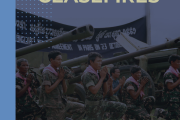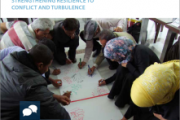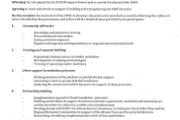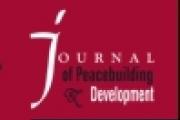Insider Mediation
Today's conflicts are increasingly decentralized and complex. Recurring violence is combined with waves of popular protests, election-related conflicts, and tensions around natural resources. With this comes the realization that short-term, international interventions alone are insufficient to address the complex and inter-dependent dynamics of these conflicts. Instead there is an increasing focus on the need for mediation capacities that are ‘national’ or local’ i.e. endogenous in order to sustain conflict resolution and prevention efforts. The concept and practice of insider mediation emerged from this recognition.
Insider mediators can be defined as "an individual or group of individuals who derive their legitimacy, credibility and influence from a socio-cultural and/or religious - and, indeed, personal - 'closeness' to the parties of the conflict, endowing them with strong bonds of trust that help foster the necessary attitudinal changes amongst key protagonists which, over time, prevent conflict and contribute to sustaining peace." Insider mediators have the advantage of being trusted and respected individuals, and therefore bring with them a higher legitimacy, cultural closeness with the parties, and an ability to use their influence and credibility to play a constructive role in dispute resolution or conflict prevention.
Photo: UN Women/Bruno Gumyubumwe
The Key Characteristics of Insider Mediation
Insider mediators can include traditional chiefs and other eminent persons, political leaders, or representatives of recognized groups, such as faith-based organizations or labor unions.
Insider mediators have long-standing relationships with individuals and communities in conflict. This sustained engagement with a particular country or community ascribes insider mediators with a unique set of relationships and insights. It is two qualities, however, that define insider mediators: legitimacy and influence.
There are different ways in which insider mediators contribute to the peaceful transformation of conflicts. They build trust and confidence between stakeholders, or serve as intermediaries, helping to exchange information and messages in formal or informal talks. In recent years insider mediators have proved successful in ensuring peaceful elections; facilitating dialogue, breaking political deadlocks and establishing the groundwork for formal peace negotiations in a number of countries.
Insider mediators are a crucial component of infrastructures for peace (I4P). First, in order to ensure the long-term sustainability of these national capacities, there must be a degree of formalization or institutionalization of insider mediation system, which could be defined as I4Ps. But the work of insider mediators themselves often provides the basis for the formation or consolidation of an I4P at the country level.
EU-UN Project on Insider Mediation
Since 2012, the United Nations has worked closely with the European Union to support the development, strengthening, and application of insider mediation capacities in a growing number of countries. The project ended its second phase in 2018 and involved activities at the global and regional levels, and sought to strengthen collaboration between the EU and the UN, including through joint conflict analysis and regional exchanges, as well as country-level activities in nine pilot countries geared towards supporting insider mediation capacities. More here.
- In the Moskitia region in Honduras, local insider mediators from indigenous communities have been trained to act as mediators to resolve land-related conflicts between the government and their communities. They now form part of an inter-institutional dialogue mechanism called the 'Territorial Governance Platform', through which regular dialogue spaces are facilitated between the indigenous people and government representatives to address land disputes and identify opportunities for sustainable development initiatives. Read case study
- The work of the Christian Council of Lesotho has been instrumental in fostering peaceful elections in Lesotho. This well-respected insider mediator group has provided a safe space for dialogue among political parties, served as a facilitator, and brought in technical experts in a timely manner to advise the parties on the best approaches, and to clarify specific matters as and when they emerged. Read case study.
- In the Philippines, insider mediators played a critical role in the Bangsamoro peace process. The 'Friends of Peace' group led by the Archbishop of Cotabato, and the Insider Mediators Group comprised of senior advisors to the parties in the peace process, as well as religious leaders and civic actors, have been able to support track-two dialogue among stakeholders in the Bangsamoro peace process. The legitimacy and trust that these eminent persons enjoy enabled them to influence key actors on politically sensitive issues that could not be discussed during the formal peace process. Through their sustained efforts, political convergence was achieved among the various parties to the peace process. The Insider Mediators Group applied their skills during the siege of Marawi City in May 2017 where they successfully supported the implementation of a joint humanitarian corridor and the release of trapped civilians and hostages. Amidst efforts by ISIS-linked militants to provoke communal tensions, the Friends of Peace Group, helped mitigate the risk of inter-religious conflict by promoting for solidarity and harmony.




